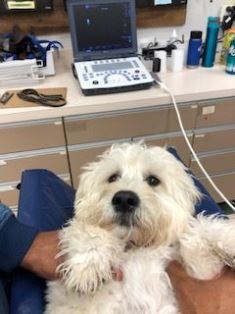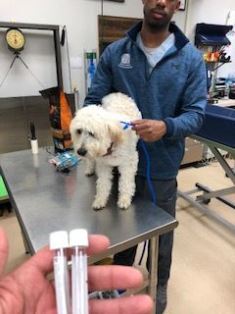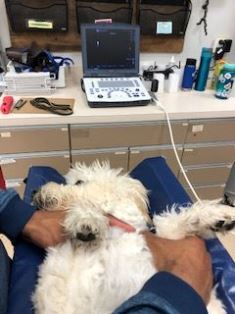Sweet Rosie is a six month old Goldendoodle. She was suddenly straining to urinate and needed to go out to squat to urinate multiple times overnight and then throughout the morning.
Her owner called BMAH, and we got her in via curbside pick-up. All of her vitals and 12 point system check-up were normal except her urinary. We use our in-house ultrasound to image and look at her bladder. It’s simple and easy with the technology we have. You would be amazed at what we could see (stones, clots, polyps, tumors etc.).

It’s also important to obtain a urine sample for analysis called a Urinalysis. A urine can tell us things that bloodwork may or cannot reveal.
Rosie was so sweet. Her bladder was thickened, and we performed an ultrasound guided cystocentesis (Cysto) to easily and quickly get a urine. It’s a good thing we did because it turns out that she did not just have a vaginitis that we would normally just treat her pain and discomfort with an anti-inflammatory for a few days. Her urine revealed she had an E.coli UTI.

Undiagnosed and untreated E.Coli UTI in a dog or cat could go on to become bladder stones within 6-12 months. If not treated properly early enough, an under-the-radar infection allows bacteria to multiply and create an unhealthy urinary environment where bacterial byproducts increase the PH of urine creating stones. We see these on ultrasounds and x-rays almost weekly at Belle Mead Animal Hospital. They won’t just go away with an antibiotic and probiotic. It may require surgery and/or special diets and antibiotics to treat it.

One last point is that urinary symptoms in animals often times wax and wane, especially in the early stages. What I mean by that is that sometimes they have symptoms that are very mild and go away, where you, the owner, thinks the pet is fine. However their E.coli did not clear itself your dog’s body and immune system is trying to take care of it and maintain balance and homeostasis, but the E.coli will ultimately rear its ugly head and clinical signs that are even worse the longer it goes undiagnosed.
So if your pet is potty trained, and especially if your adult pet never really has urinary accidents in the house, but you notice that we are having more occasional urinary accidents or increase posturing than normal to urinate, there is reason to contact your family veterinarian. When dogs go for their routine eliminations, it should be one or two, then done – not posturing 3 or 4 times. Don’t just blow it off. Make a mental note – this was your sign and time to remember to call us. You can catch and collect a urine at home and drop it off for a urinalysis. If you can’t do this, we can easily get it via a cysto or cystocentesis – just don’t let your dog urinate right before coming into the hospital.
Dr. Joe Martins, DVM, Belle Mead Animal Hospital



